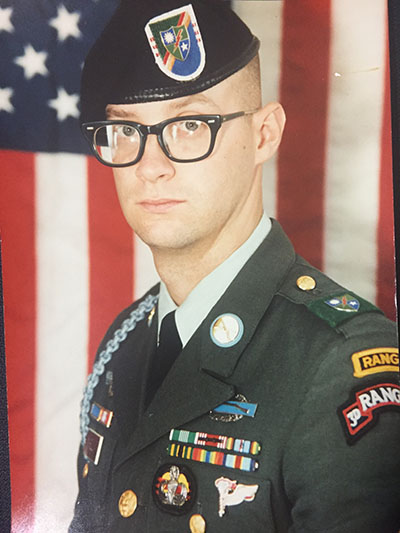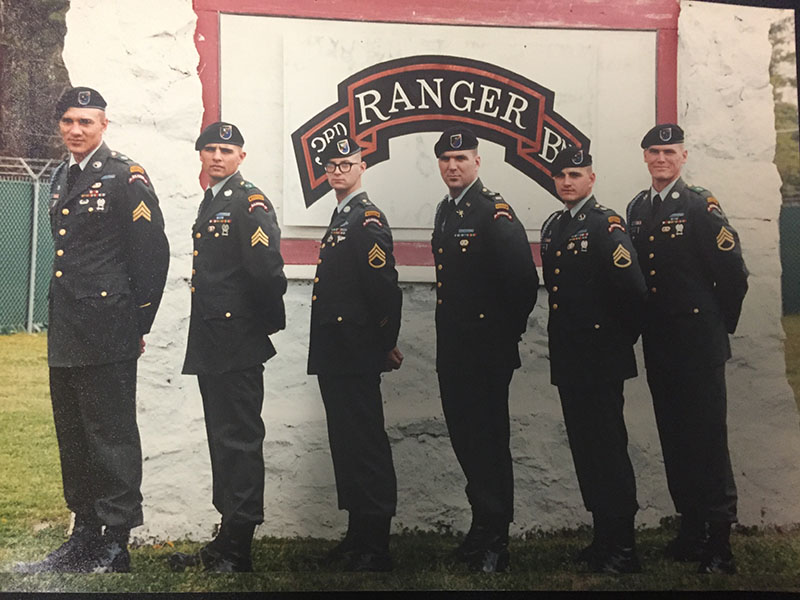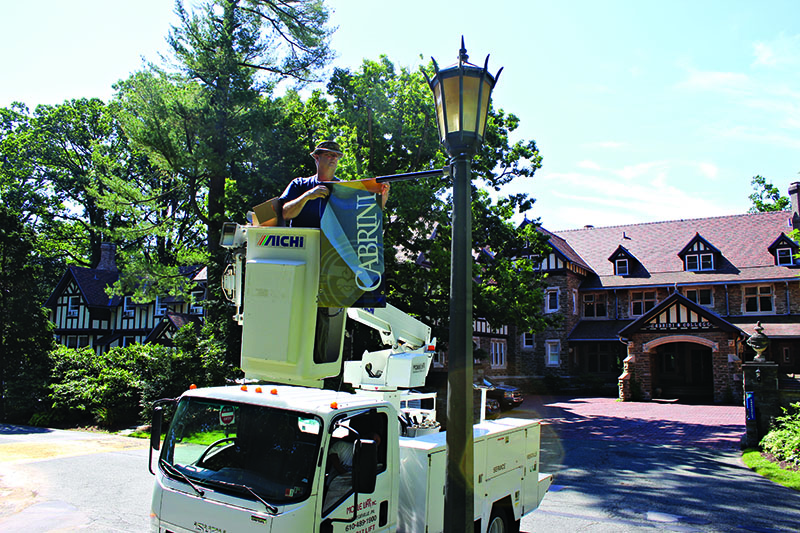Even if you know Sean Kelly, you probably don’t know Sean Kelly.
A groundskeeper at Cabrini for 15 years, Kelly’s around campus a lot. He says most people know him as “the guy in the loader,” and sure enough, he often can be found behind the wheel of the giant green facilities equipment. Even if you haven’t seen Kelly, you’ve seen his handiwork, evident in the well-manicured pathways and careful upkeep of campus.
You may know Cabrini groundskeeper Sean Kelly, but you probably don’t know retired U.S. Army 1st Sgt. Sean Kelly, a member of the Ranger Hall of Fame and the U.S. Army Ranger Association’s 2011 Airborne Man of the Year.

Kelly served for 20 years in the U.S. Army, nearly exclusively as an Airborne Ranger, amassing 147 airborne jumps, including leading two combat parachute jumps—both from less than 500 feet, meaning it would be impossible to deploy an emergency parachute if necessary, and both under enemy fire. He’s served tours of duty in Germany and Korea and served the Ranger Training Brigade as a Ranger Instructor and Company First Sergeant.
Sean Kelly has been there and back. He’s been on both sides of the equation, both as a returning veteran and as a family member of a returning veteran. (Kelly’s sons are both in the Army; one was in the Army National Guard and was deployed three different times; another, a Cabrini graduate, deploys to Afghanistan next year.) And now, he’s helping others, serving as a voice for current servicemen and servicewomen and returning veterans, a bridge between military and civilian life.
According to Kelly, there are similarities between the two. A career in the Army is about developing leadership, and at the heart of it, you’re still dealing with personal relationships. The difference, he says, is in intensity and purpose.
“It’s like everywhere else—we’re people,” said Kelly. “In the Army, procedures are built to ensure efficiency, but that still doesn’t change the fact that I have to deal with you on a one-to-one level. It’s about three things: Trust, trust, trust. I have to trust you with my life. And trust comes from communicating.
“In the civilian world, a boss has no control over a worker once that person leaves the job for the day. In the Army, you control practically every aspect of a soldier’s life. Your overall purpose is to defend the nation. The accountability and responsibility far exceed what you see in civilian life. You’ll hear this all the time: ‘You are responsible for what that person does or does not do.’ That’s a lot of responsibility.
“I’m sure your body, your mind, reacts to that pressure, but it’s just part of your job. You’re still dealing with human beings. You want to organize people, you want to motivate people, you want to give them direction, all those things are still there—but with an increased level of accountability, responsibility, and intensity.”
The difficult transition, according to Kelly, is returning from service and re-entering civilian life.
“It’s like a cold bucket of water. You go from a very purpose-driven existence, where leadership and responsibility and accountability are paramount, to the civilian world, where there’s none of that. In the civilian world, you’re working for eight hours a day, and then you’re done. In the Army, we’re spending 12, 16 hours a day, depending on what we’re doing, we might go out Monday and not come back until Friday morning. [In the military] You’re spending more time with your coworker than you are with your family.”
Establishing a good support system back home, with an emphasis on family, has become a bigger focus for the armed services, particularly since post-traumatic stress disorder (PTSD) has become a mainstream issue, said Kelly.
Kelly, who met his wife in high school, still remembers the phone conversation they had when their relationship started to get serious. “I said, ‘You want to get serious, you have to understand: What I’m doing, what I want to continue to do—you’re not going to have a “family life” like a normal person. I’m not going to go off to war with you and the kids. I’m going off to war with these 40, 150, 200 guys that I am responsible for training, and they have to be ready, so I can come back to you.’ I don’t know too many people that have that honest conversation, or even have the forethought to have that conversation. And she definitely supported me in my career. She took on that mantle.
“By the middle of my career, my wife was teaching Army family team building. It was about a dozen lessons, nothing more than ‘This is the subculture of our society, this is how we do things, here is the chain of command, that music that you hear in the morning is reveille, here’s where you go for health care,’ all that stuff. At the end of my career, that was a well-established program.
“When the war on terrorism came along, soldiers were dealing with high-intensity combat and re-entry,” said Kelly. “Suicide rates went up, domestic violence went up, guys didn’t know how to deal. They’d drink, do drugs, other risky behaviors.”

The adjustments for families experiencing a member returning from service can be extreme and complicated.
In any relationship, each person involved gets something from the relationship, and each person gives. “When that person deploys, that’s gone,” said Kelly. “Family members have to find what they got from someplace else, or deal with not having it, and continue with life while that person is out doing whatever they have to do. There are adjustments when they leave, and there are adjustments when they come back. Things have changed. Roles and responsibilities, things that you always did, family chores, whatever, someone else took those responsibilities over while you were gone. And there may be some resentment.”
Still, even deeper than dealing with day-to-day activities, there is a level of having to get to know someone all over again, and adapting to changes in personality. One of the most challenging issues affecting relationships is an inability for returning veterans to communicate their experiences. According to Kelly, it’s an automatic disconnect. Returning veterans can’t communicate the experience, but even if they could, it isn’t something a person can necessarily internalize unless he or she has lived it.
“You get a whole different perspective of the world” in the military, said Kelly. “Most civilians see the world through wherever they get their news: the television, the Internet, periodicals, that’s their world. In the military, guess what: These people are there. I can’t communicate it,” said Kelly. “My son says the same thing. He’s got some of the best friends, guys from the 9th grade. He still hangs out with these friends from high school. They’re great guys, but they’re clueless. They don’t know what they don’t know. He’s frustrated because he can’t share that with them, because they just don’t get that.
“Killing a bad guy doesn’t bother some people,” said Kelly. “It’s the collateral damage, the stuff you see, that’s the stuff that gives people nightmares. Other people, they have this intense guilt for taking a life. They can’t rationalize it like other people. And then some people can just handle it all. When someone says it hasn’t changed them, I’m highly suspect. There is something, somewhere, that you’re doing to cope. And if not, you’re one lucky, lucky individual.”
As the Army attempts to determine why some people can handle the experience better than others—research that is ongoing as more and more cases of PTSD are realized—Kelly believes that communication is key to traversing a successful transition and re-entry.
“First,” said Kelly, “acknowledge it and research it. Be aware that returning veterans may resort to coping mechanisms—and it’s usually not in a good way.” But most importantly, said Kelly, the veterans themselves need to acknowledge it. “It’s like any other behavior change: Nothing is going to happen until that individual goes, ‘I have to do something.’ What triggers that? A conversation? An intervention? People have to make their own connection. Accept the fact that this is going to change you to a degree,” and get help.
Kelly sees an opportunity for higher education institutions like Cabrini to reach out to the military while soldiers are in training. “Education is huge in the military,” said Kelly. “They want people who can think. You’re faced with so many ambiguous situations, and you have to work your way through it, think critically, exercise judgment.”

According to Kelly, Cabrini can help servicemen and -women equip themselves with the skills provided by a college degree—effective communication, critical thinking, and a level of self-awareness—that will not only help them advance their careers, but could also help ease the transition of re-entering civilian life after service.
“We have leadership programs. We have the History Department. We’re situated close to Fort Dix, Lakehurst, and Maguire. The 28th Division is near Harrisburg, and there are all sorts of armories within 15 miles of here. Three company commanders that I served under became four-star general officers. These are guys that I knew and later on in their career, they’re sitting at the White House, forming policy. Let’s get them in here, have them talk to people. Naval officers, Air Force officers, Army National Guard officers, come on down, come listen to this guy, because he has been where you want to go.
“We need to get out there, and we need to talk to them. We’ve got to make contact. What are their challenges? What do they want to see, education-wise, in soldiers? What’s going to support their mission? We need to serve them.”
Serving those who serve? When it comes to strengthening a nation, that sounds like a good place to start.